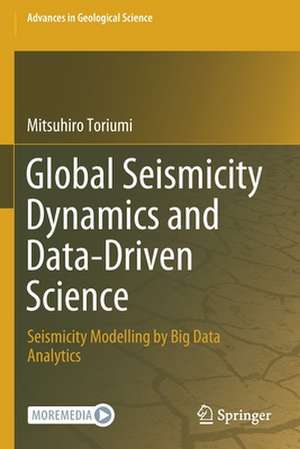Global Seismicity Dynamics and Data-Driven Science: Seismicity Modelling by Big Data Analytics: Advances in Geological Science
Autor Mitsuhiro Toriumien Limba Engleză Paperback – 9 oct 2021
| Toate formatele și edițiile | Preț | Express |
|---|---|---|
| Paperback (1) | 882.17 lei 6-8 săpt. | |
| Springer Nature Singapore – 9 oct 2021 | 882.17 lei 6-8 săpt. | |
| Hardback (1) | 893.53 lei 6-8 săpt. | |
| Springer Nature Singapore – 8 oct 2020 | 893.53 lei 6-8 săpt. |
Preț: 882.17 lei
Preț vechi: 1075.81 lei
-18% Nou
Puncte Express: 1323
Preț estimativ în valută:
168.83€ • 175.60$ • 139.37£
168.83€ • 175.60$ • 139.37£
Carte tipărită la comandă
Livrare economică 14-28 aprilie
Preluare comenzi: 021 569.72.76
Specificații
ISBN-13: 9789811551116
ISBN-10: 9811551111
Ilustrații: IX, 231 p. 230 illus., 184 illus. in color.
Dimensiuni: 155 x 235 mm
Greutate: 0.35 kg
Ediția:1st ed. 2021
Editura: Springer Nature Singapore
Colecția Springer
Seria Advances in Geological Science
Locul publicării:Singapore, Singapore
ISBN-10: 9811551111
Ilustrații: IX, 231 p. 230 illus., 184 illus. in color.
Dimensiuni: 155 x 235 mm
Greutate: 0.35 kg
Ediția:1st ed. 2021
Editura: Springer Nature Singapore
Colecția Springer
Seria Advances in Geological Science
Locul publicării:Singapore, Singapore
Cuprins
- Introduction.- Nature of Earthquakes in the Solid Earth.- Global Seismicity of the Solid Earth.- Data – Driven Sciences for Geosciences.- Data-Driven Science of Seismicity.- Down Scaling Seismicity of Japanese Regions.- Correlated Seismicity of the Northern California Region.- Model of Seismicity Dynamics from Data-Driven Science.- Seismicity Dynamics Model of Global Earth and Japanese Island Region.- Predictive Modeling of Global and Regional Seismicity Rates.- Future Problems of Prediction of Giant Plate Boundary Earthquakes.- Application of Recurrent Neural Network (RNN) Modeling for Global Seismicity Dynamics.- Comments on Databases and Software Used in This Book.
Notă biografică
Mitsuhiro Toriumi is a senior researcher at the Japan Agency of Marine – Earth Science and Technology (JAMSTEC). He was chief scientist of the board of innovation center of JAMSTEC and studied application of data-driven science and machine learning for global and regional seismicity. He was the research director of the Institute for Research on Earth Evolution (IFREE) and a professor in the Department of Complex Science and Engineering and a professor in the Faculty of Science, The University of Tokyo. During his early career, he was an associate professor of the Faculty of Science of Ehime University and an assistant professor of The University of Tokyo. He is an invited professor of the Open University of Japan. He has published and edited several books in the field of petrology, rheology, earth science, and solid earth science. He is a committee member of the Research Organization of Information and Systems of Japan and an adviser in Core Research for Evolutionary Science and Technology (Information and Measurement). He has been awarded the Geological Society of Japan Award.
Textul de pe ultima copertă
The recent explosion of global and regional seismicity data in the world requires new methods of investigation of microseismicity and development of their modelling to understand the nature of whole earth mechanics. In this book, the author proposes a powerful tool to reveal the characteristic features of global and regional microseismicity big data accumulated in the databases of the world. The method proposed in this monograph is based on (1) transformation of stored big data to seismicity density data archives, (2) linear transformation of microseismicity density data matrixes to correlated seismicity matrixes by means of the singular value decomposition method, (3) time series analyses of globally and regionally correlated seismicity rates, and (4) the minimal non-linear equations approximation of their correlated seismicity rate dynamics. Minimal non-linear modelling is the manifestation for strongly correlated seismicity time series controlled by Langevin-type stochastic dynamicequations involving deterministic terms and random Gaussian noises. A deterministic term is composed minimally with correlated seismicity rate vectors of a linear term and of a term with a third exponent. Thus, the dynamics of correlated seismicity in the world contains linearly changing stable nodes and rapid transitions between them with transient states. This book contains discussions of future possibilities of stochastic extrapolations of global and regional seismicity in order to reduce earthquake disasters worldwide. The dataset files are available online and can be downloaded at springer.com.
Caracteristici
Presents detailed explanations of step-by-step descriptions of data handling from international earthquakes database Describes proposed stochastic dynamic equations controlling globally and regionally correlated microseismicity Includes discussions of future possibilities of stochastic extrapolations of global and regional seismicity









